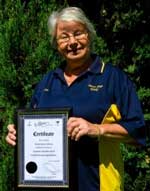



Industry Trainers Are Helping Others to Qualify
AUSTRALIA - New industry trainers are assisting in the uptake of national poultry relevant qualifications.Increased participation in national certificate qualifications relevant to poultry production is gaining momentum, with one of the CRC-sponsored industry personnel who gained the Certificate IV in Training and Assessment now helping to evaluate the needs of industry personnel in making progress towards these certificates.

Suzanne McInerney, from Country Range Farming near Toowoomba, is one of several in industry sponsored by the CRC to become industry trainers within Registered Training Organisations (RTOs) offering the certificates in agriculture.
"There was a need for trainers that not only knew the systems and requirements of producers already within the industry, but who also spoke the same language and understood the limitations of their computer capabilities," said Suzanne, who is now delivering in-house computer training.
"I'm working with the CRC's Julie Roberts and Country Range Farming towards gaining RPL [Recognition of Prior Learning] accreditation for a Certificate II in Agriculture."
"There is a possibility, through QEFA, of using my training skills by developing and delivering simple computer models to be given together with training to small free range poultry producers."
"These models would allow the producer to monitor their production, feed consumption and cost per hen, leading to improved animal welfare and profit margin."
"I'm very grateful to the Poultry CRC for giving me this opportunity to expand my skills and am looking forward to putting them to good use when the new certificate comes on line," said Suzanne.
Poultry CRC Education Coordinator, Julie Roberts, said the Certificate IV enables industry people to deliver accredited training in their areas of expertise.
"It also helps them liaise between employees in their workplace and the RTO with which their company works," said Julie.
"Since vocational training moved away from the classroom towards the workplace in the late 90s, the workplace supervisor provides the content expertise for training and the RTO provides the educational input."











